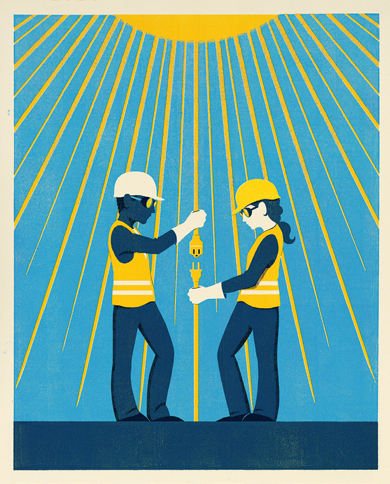A few fresh juicy ripe articles picked fresh for you. The New York Times Magazine Climate issue is very well done.
- All businesses exposed themselves to risk, which had to be mitigated, insured or, more relevantly, defended against. Even if the Pinkertons couldn’t predict the specific risks of the future, they had a general sense of what it might look like — and what opportunities they might avail themselves of as it materialized. According to the World Bank, by 2050 some 140 million people may be displaced by sea-level rise and extreme weather, driving escalations in crime, political unrest and resource conflict. Even if the most conservative predictions about our climate future prove overstated, a 1.5-degree Celsius rise in temperature during the next century will almost certainly provoke chaos, in what experts call climate change’s “threat multiplier”: Displacement begets desperation begets disorder.
What Survival Looks Like After the Oceans Rise -NYT
- Standing sometimes waist-deep in seawater on the shores of the Bay of Bengal in Bangladesh, they work to find bricks, dig them out of the sludge and cart them to the side of the road to sell. The job is new, a result of devastating storm surges a little more than a decade ago. In 2007, and then again in 2009, cyclones battered the coastline just south of Kuakata, destroying homes and structures and drowning entire villages. The storms submerged forests of mangroves and left 99 local residents dead.
The sisters Kulsum and Komola Begum survived. Now they scavenge, looking for debris. They wait until low tide, when the receding waves reveal the rubble. Once they’ve wheeled bricks to the embankment, they break them into small, chestnut-size pieces. These shards are used in the foundations for homes in the new village, a mile up the shore.
The Age of Robot Farmers -The New Yorker
- He explained that the entire farm has to be picked every three days—or a third every day. Growers want a steady flow of berries to reach the market throughout the season, rather than having a glut of berries arrive all at once, which would cause the price to fall. Up until recently, Wishnatzki has relied on cheap labor to get his berries picked—a fundamental of American agriculture, along with abundant land and water.
In recent years, though, seasonal labor has become much more scarce, and more expensive—making it difficult for growers of apples, citrus, berries, lettuce, melons, and other handpicked produce-aisle items to harvest their crops. Years of attempts to crack down on illegal immigration, both at the state and the federal level, partly explain these chronic shortages. In 2011, for example, Georgia enacted a strict immigration law that targeted undocumented workers and their employers. Later that year, the state reportedly lost eleven thousand crop workers. To fill the gap, officials established a program whereby nonviolent offenders nearing the end of their prison terms could do paid farmwork. The program had few takers, and many prisoners and probationers who did try it walked off the job, because the work was so hard. Georgia farmers lost more than a hundred and twenty million dollars.
Where Our New World Begins: Politics, Power, and the Green New Deal -Harpers
- Like every other human endeavor, the New Deal did not work perfectly. The men and women who put it into motion made mistakes, and they were not always able to overcome the opposition. They were forced to compromise and improvise and rethink what they were doing. But they made it work. They controlled a seemingly uncontrollable crisis—a series of existential threats, really, in the United States and the wider world—and in so doing they expanded human liberty at a time when so many others were trying to do away with it.
We find ourselves today in much the same place, confronted by an array of emergencies—seemingly disparate, but in fact closely connected—that threatens to destroy us. Braced against them is a set of ideas put forward in a congressional resolution by Alexandria Ocasio-Cortez (the notorious AOC), a twenty-nine-year-old freshman congresswoman, and her young, ad hoc brain trust. They have put into words the growing convictions of many over the years that we cannot go on the way we have been if we are to survive and continue to keep our liberties. It is altogether fitting and proper that this effort has been named the Green New Deal, for it seeks to draw what worked best from the original New Deal and to learn from its mistakes. How well we do in putting its ideas, goals, and promises into effect will determine what our world will be like for a very long time to come.
But I don’t wish to sound so grim about the endeavor. Here is where our new world begins.
